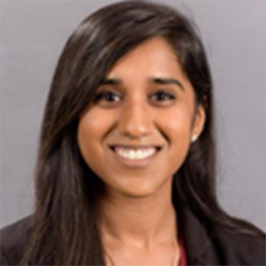Cardio-Oncology, Women in Medicine, and More: Interview With Ana Barac, MD, PhD, FACC
Ana Barac, MD, PhD, FACC, is Regional Director of the Cardio-Oncology Program at the MedStar Heart and Vascular Institute and Georgetown MedStar Cancer Institute, Professor of Medicine at the Georgetown University School of Medicine. In addition, she works on research protocols at the National Institute of Heart, Lung, and Blood Institute's Clinical Physiology laboratory using cardiac magnetic resonance imaging to advance the understanding of cardiomyopathies. In this interview, she talks about her career in cardio-oncology, her experiences with the ACC, and shares advice for medical students interested in the field.
What led you to pursue cardio-oncology?
During medical school, I became fascinated with molecular signaling and mechanisms underlying cellular communication. After working at the National Institute of Health and completing my Ph.D., I underwent clinical training to apply knowledge of molecular signaling in relevant disease models. During residency, I became interested in the mechanisms of cardiovascular disease and the power of cardiac imaging.
Trastuzumab is a monoclonal antibody against the HER2 receptor that is overexpressed in about 20-25% of breast cancers. During my training, a trial by Dr. Slamon and colleagues (1), found that while adding trastuzumab to anthracycline chemotherapy improved survival among HER2-positive metastatic breast cancer patients, more than 25% of women developed heart failure. This led to echocardiographic surveillance during trastuzumab treatment. This adverse effect provided opportunities to ask many questions: Why does the heart function decline, what are the predictors, and how could we prevent it? These cardio-oncology questions bridged my passion for patient care, molecular signaling, and cardiac imaging. They continue to drive my love for this field today.
Tell us about your roles in the American College of Cardiology.
During my cardiology fellowship, one of my projects examined whether patients with BRCA1/2 mutation had increased susceptibility for anthracycline-related cardiac dysfunction. Unfortunately, it was hard to enroll patients as I was not embedded in the care of breast cancer patients. This inspired us to create a cardio-oncology clinic which I further developed when I joined the faculty at MedStar Heart and Vascular Institute.
Like me, cardiologists in different settings were wondering how to diagnose cardiotoxicity, communicate to oncologists, and how to better treat patients. I was part of the ACC Early Career (EC) Section and Council. In 2012, the Chair of the ACC EC and I published an article on "How to (and Why) start the cardio-oncology clinic". Soon after, a Cardio-Oncology Working group was created. To understand the needs of the patients and physicians, we conducted an environmental survey and found that education and training were among the critical gaps for both cardiologists and oncologists.
Thus, we proposed to create an ACC Cardio-Oncology Section to meet patient and provider needs. Fast forward seven years, so many more resources are available! JACC Cardio-Oncology was just launched in 2020, which is a fantastic advancement for the field.
What is the status and future of cardio-oncology?
Two words: Thriving and expanding. We are getting closer to having standard pathways for diagnosing and treating CV toxicities. Cardio-oncology services continue to be established to support oncology programs worldwide. Cardio-oncology education is increasingly incorporated into the CV fellowship training, and there are now dedicated cardio-oncology programs.
I believe that the future is definitely bright! A growing number of cardio-oncology trials offer promise for better guidance of care. Practices will continue to mature and reflect new oncology therapies, as well as CV disease diagnosis and treatment advances. I envision many cardio-oncology programs collaborating with fields such as immunology, endocrinology, and/or rheumatology. Another area of interest will be understanding the shared risk factors for cancer and cardiovascular disease development.
What barriers do you see that need to be eliminated to encourage more female medical students and residents to pursue cardiology?
There are many barriers as the fellowship and post-fellowship training continues to get longer and patient care becomes more complex. In addition, family responsibility and childbearing often fall more significantly on women. Recently, there has been an increase in awareness of the many challenges related to childbearing. The ACC's Women in Cardiology (WIC) Section's 1998 and 2017 surveys have provided important insight into these challenges and created a framework for future activities.
Do not let these challenges intimidate you! Join a professional group and be part of the solution. These issues must be addressed because they affect everyone.
Do you have any advice for medical students interested in cardiology and cardio-oncology?
Find your passion, get a mentor(s), and enjoy the (long) ride! If you are passionate about a topic, keep asking questions, you will go far. Cardio-oncology is broad and amazing, and it is not too early to get involved in cardio-oncology in medical school. Paths to it can come in many different flavors. Find and follow the questions that you are passionate about. You will find your way into the field.

This article was authored by Mariana Henry, MPH, medical student at the Geisel School of Medicine at Dartmouth in Hanover, NH. Twitter: @marianahenryL
This content was developed independently from the content developed for ACC.org. This content was not reviewed by the American College of Cardiology (ACC) for medical accuracy and the content is provided on an "as is" basis. Inclusion on ACC.org does not constitute a guarantee or endorsement by the ACC and ACC makes no warranty that the content is accurate, complete or error-free. The content is not a substitute for personalized medical advice and is not intended to be used as the sole basis for making individualized medical or health-related decisions. Statements or opinions expressed in this content reflect the views of the authors and do not reflect the official policy of ACC.

